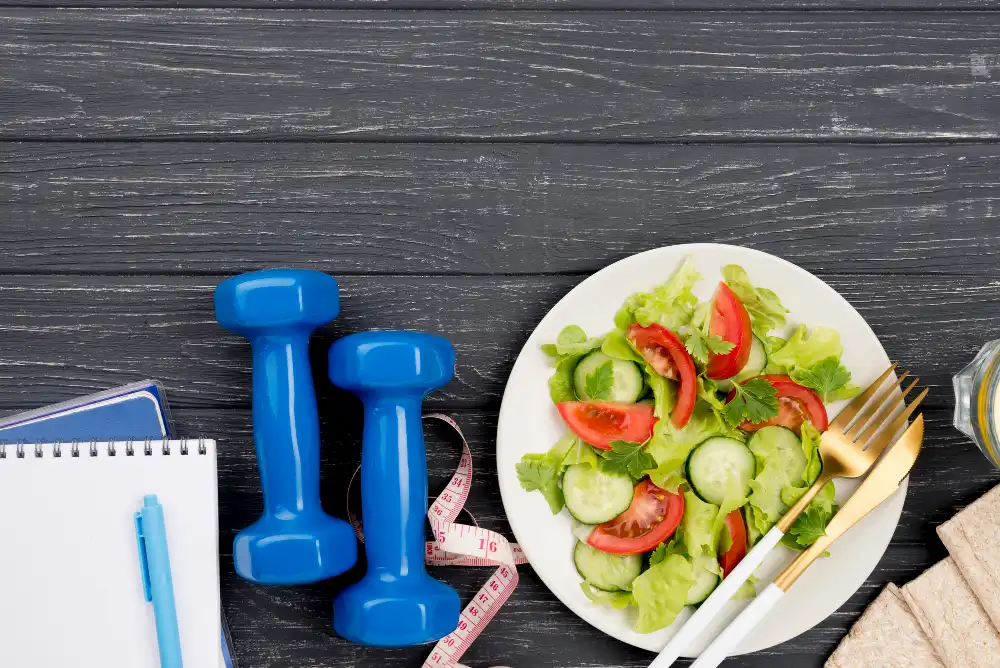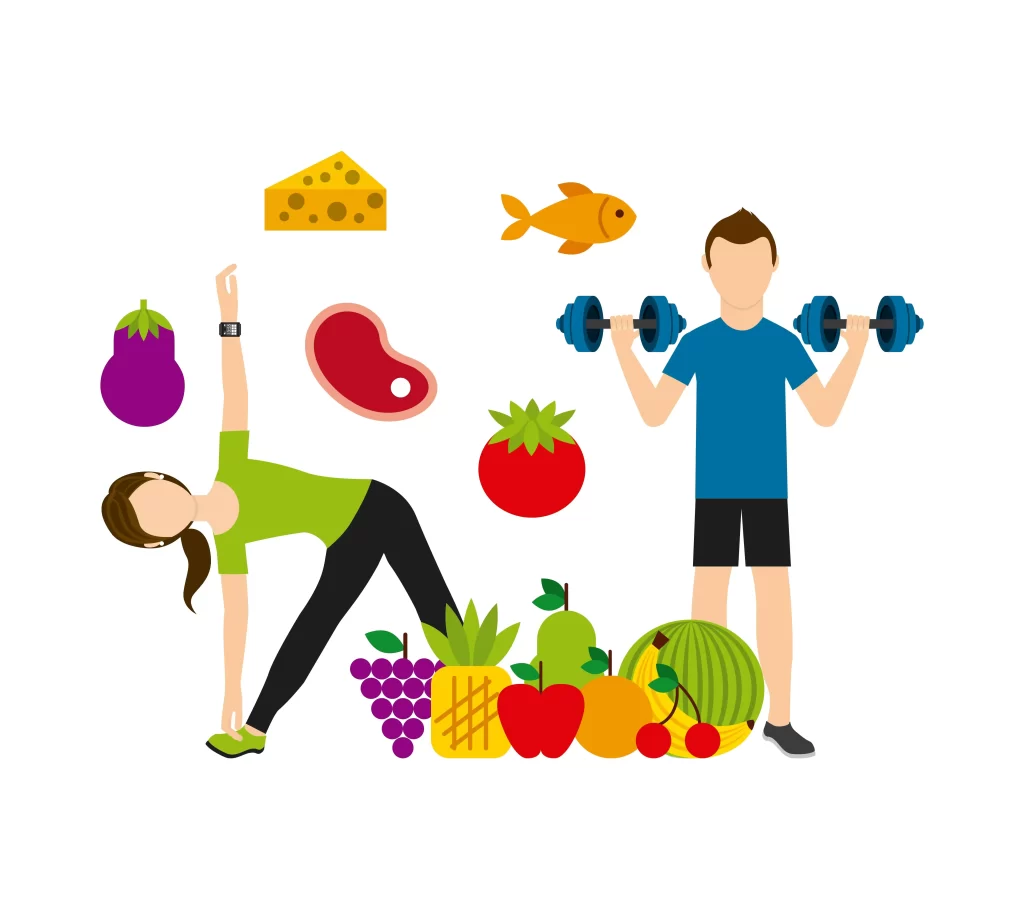I’m sure you’ve heard the saying, “Abs are made in the kitchen,” and there’s a reason why it’s a fitness mantra.
Hi there, fitness enthusiast! Today, I will dive into the intricate world of muscle-building and unveil the vital role of diet in sculpting those gains you’ve been striving for.
What is muscle building?
Muscle building, scientifically termed hypertrophy, is increasing muscle size through various forms of resistance training.

The role of diet in muscle building
While hitting the weights is essential, your diet acts as the fuel that powers your gains. Without proper nutrition, your muscles won’t have the necessary building blocks to grow and repair.
Macronutrients for muscle building
Protein is the cornerstone of muscle growth, providing the amino acids necessary for repairing and building new muscle tissue.
Carbohydrates Carbs serve as your body’s primary energy source, fueling intense workouts and replenishing glycogen stores in your muscles.
Fats Healthy fats are crucial for producing hormones and absorbing fat-soluble vitamins, supporting overall health and muscle function.
Micronutrients for muscle building
Vitamins D, C, and B-complex are essential in energy metabolism, immune function, and muscle repair.
Minerals like calcium, magnesium, and zinc are essential for muscle contractions, nerve function, and electrolyte balance.

Timing and frequency of meals
Pre-workout nutrition: Fueling with a balanced meal containing carbs and protein before a workout provides the energy and nutrients your muscles need to perform optimally.
Post-workout nutrition Consuming a combination of protein and carbs within the post-workout window helps replenish glycogen stores and kickstarts the muscle repair process.
Eating smaller, balanced meals throughout the day keeps your energy levels stable and ensures a steady supply of nutrients for muscle growth.
Importance of hydration
Water intake: Staying hydrated is crucial for optimal muscle function, performance, and recovery.
Electrolytes like sodium, potassium, and chloride help maintain fluid balance and support nerve and muscle function.
Supplements for muscle building
Protein supplements: Protein shakes and powders can be convenient protein sources, especially for those with busy lifestyles.
Creatine supplementation has been shown to enhance muscle strength and performance during high-intensity exercise.
Branched-chain amino acids (BCAAs) BCAAs, particularly leucine, play a key role in stimulating muscle protein synthesis and reducing muscle breakdown.
Tailoring diet to individual needs
Caloric surplus vs. deficit Whether you’re aiming to bulk up or lean down, adjusting your calorie intake accordingly is essential for achieving your muscle-building goals.
Body type and metabolism Understanding your body type and metabolic rate can help tailor your diet and training regimen for maximum results.
Common misconceptions about diet and muscle-building
Eating more protein equals more muscle. While protein is essential for muscle growth, excessive consumption won’t necessarily lead to more gains.
Carbohydrates are bad for muscle building. Carbs are your body’s preferred energy source during intense workouts and are essential for fueling muscle growth.
Planning and tracking your diet
Meal planning: Preparing meals in advance can help you stay on track with your nutrition goals and avoid impulsive, unhealthy food choices.
Tracking progress Keeping a food diary or using a tracking app can help you monitor your calorie and nutrient intake and adjust as needed.
Balancing diet with exercise
Importance of resistance training: Incorporating strength training exercises into your routine is essential for stimulating muscle growth and development.
Cardiovascular exercise: While cardio is essential for overall health and fitness, too much can interfere with muscle recovery and growth if not appropriately balanced.

Rest and recovery
Sleep is crucial for muscle repair, hormone regulation, and overall recovery.
Rest days Taking regular rest days allows your muscles to recover and grow stronger between workouts.
Lifestyle factors affecting muscle building
Stress management Chronic stress can increase cortisol levels, negatively impacting muscle growth and recovery.
Alcohol and its impact: Excessive alcohol consumption can impair muscle protein synthesis and hinder recovery, so it’s best to enjoy alcohol in moderation.
Sustainable dieting for long-term gains
Avoiding crash diets Extreme calorie restriction or fad diets may result in short-term weight loss but can be detrimental to muscle mass and overall health in the long run.
Gradual changes for lasting results: Making small, sustainable changes to your diet and lifestyle over time is critical to achieving and maintaining your muscle-building goals.
Case studies or success stories
Real-life examples of adequate diet and muscle-building regimens Sharing stories of individuals who have successfully transformed their physiques through proper nutrition and training can provide inspiration and motivation.

Conclusion
In conclusion, fueling your gains with the proper diet is paramount for achieving your muscle-building goals. By prioritizing nutrient-dense foods, staying hydrated, and supporting your body with appropriate supplementation, you can optimize your performance in the gym and accelerate your progress toward a more substantial, leaner physique.
FAQs:
How much protein do I need to build muscle?
The recommended daily protein intake varies depending on age, gender, and activity level. Still, a general guideline is around 0.8-1 gram of protein per pound of body weight.
Do I need to take supplements to build muscle?
While supplements can be beneficial for filling nutrient gaps or enhancing performance, they are not necessary for building muscle if you have a well-rounded diet.
Can I build muscle while losing fat?
Yes, it’s possible to build muscle and lose fat simultaneously, but it requires careful attention to both diet and exercise, including a slight calorie deficit and adequate protein intake.
How important is hydration for muscle building?
Hydration is crucial for muscle function, performance, and recovery, so drink plenty of water throughout the day, especially before, during, and after workouts.
Is it better to eat before or after a workout for muscle growth?
Both pre-and post-workout nutrition is essential for muscle growth and recovery, so consume a balanced meal or snack containing protein and carbs within a couple of hours before and after your workout.

